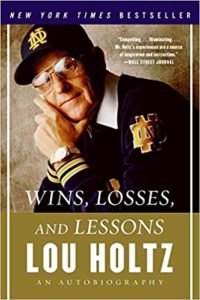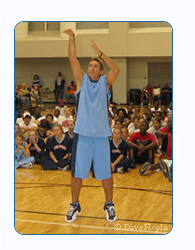 How a coach organizes and gets his team to execute a “Time Out Huddle” probably falls under the category of “How you do anything is how you do everything” because it is one aspect of a basketball game that is sometimes overlooked (and is allowed to be done in a “less than perfect” manner).
How a coach organizes and gets his team to execute a “Time Out Huddle” probably falls under the category of “How you do anything is how you do everything” because it is one aspect of a basketball game that is sometimes overlooked (and is allowed to be done in a “less than perfect” manner).
I came across the idea for this post as I was reading the book by legendary football coach Lou Holtz called “Wins, Losses and Lessons: An Autobiography”. The book is basically about Coach Holtz’s life growing up and becoming a football coach. While I was hoping there would be more blatant “secrets of winning”, I was able to discover a bunch of good ideas for coaches and players.
In the book, (page 191 if you are interested), Coach Holtz says the following,
“Execution is about paying attention to the details. If a team looks sloppy in the huddle, it will look sloppy during the play. If players are unruly on the sidelines, they will be undisciplined on the field. We set standards in that spring practice that many of those athletes had never seen before.”
Coach Holtz goes on to tell the story about how he coached his team to “properly execute a huddle” and how it helped his football team become better. What follows is my take on a basketball version of that.
What is a properly executed Time Out Huddle in basketball?
The ideas below can be applied to a Full time out or a 30 second timeout. The only difference is that the 30 second timeout would be done with the players standing up (on the court).
Perception is Reality
I should probably start by answering the question, “Why do we care how the team executes a time out huddle?” There are probably many reasons but, for me, the biggest reason is the psychological impact on the other team. If they see us RUN to our timeout, it tells them that we have more energy than they do, especially late in the game, and are probably less tired than they are. This is one small way to demoralize the competition. Aside from that, it can also impress the parents and fans in the stands since if they are rooting for us to win, they like to think that we are in better shape than the competition.
Rule 1 for a proper Time Out Huddle: We RUN to the huddle.
Everything and Everyone has a place.
The 5 chairs next to the head coach are where the players who are IN the game will be sitting. If someone is being substituted, they tell the person they are going in for and then take a seat with the other active players.
The coach will move his chair so that it faces the 5 Active Players. In case the chairs are not moveable, the coach will simply stand or squat in front of the active players.
The next 5 players on the bench will stand BEHIND the active players and hand them their drinks and towels. Right hand = drink, Left hand = towel. This assumes you have 15 players total (the max for varsity in NH) so there are another 5 players who stand behind the head coach. Assistant coaches are on the left and right ends of the active players so they can hear the head coach and offer suggestions if called upon.
Speaking of suggestions, and this may be something particular to a head coach’s style, this formation lends itself to a 5-10 second window of time when the players are getting to the bench and getting something to drink where the assistant coaches can feed the head coach their ideas/thoughts/suggestions. I know that is not much time but if a head coach wants the input, it is important for assistant coaches to be concise with their communication. Remember, timeouts are not long and it is important to get the right information to the active players so that they can head back out on the court and compete effectively.
Rule # 2 for a proper Time Out Huddle: Fill The Formation
Listen up !
The final focus of an effective Time out huddle is ATTENTION. All players should be listening to what the head coach is saying so they are prepared to go out on the floor and execute the strategy. All it takes is one person not paying attention to miss a key point of the conversation which could translate into a critical mistake at a key point later in the game.
Rule # 3 for a proper Time Out Huddle: Pay Attention!
As I said in the beginning, “How you do anything is how you do everything.” That means that they way that you execute your Time Out Huddle reflects how you execute any other part of your game. If you are serious about winning a basketball game, you need to be serious about each component that goes into that game, whether it is making foul shots or playing tough defense or something as simple as how you set up and perform your Time Out Huddle. For my teams, I like to say “We run our timeouts like champions.” and it also shows the competition that we are not a “typical” team. We are special. We care about doing the things that are required to win.
What does your Time Out Huddle say about your commitment to winning basketball games?










